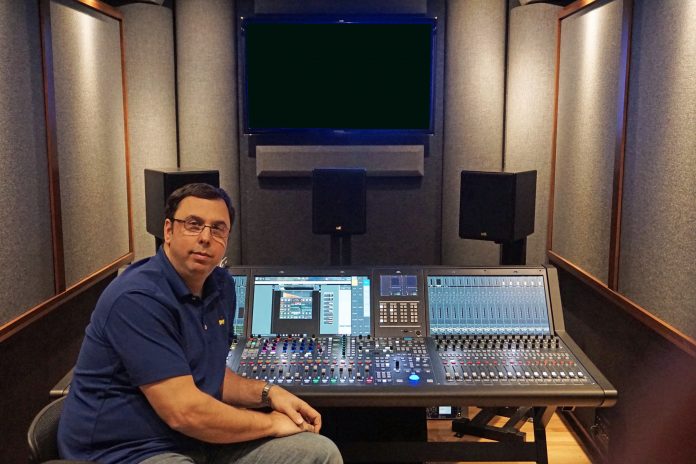Music Mix Mobile (M3) celebrates a decade of award-winning remote-production recording and mixing for major broadcast events including the GRAMMY Awards, the CMA Awards, the Rock & Roll Hall of Fame Induction Ceremony and more, with plugins from Waves used as an integral part of all of these productions.
In a unique take on artist endorsements, Music Mix Mobile is the artist as well as the production facility, with a relationship between Waves and the M3 forming a true long-term partnership.
For a decade now, Music Mix Mobile’s award-winning team of mixers, including founders and co-owners John Harris, Jay Vicari, Mitch Maketansky and Joel Singer, have provided remote recording/mixing/broadcast audio services for countless high-profile events, including many of the major awards shows — the GRAMMY Awards, the CMA Awards, the Rock & Roll Hall of Fame Induction Ceremony, the Emmy Awards and more. In the process, they have also won awards of their own for excellence in sound, including GRAMMY, Emmy, TEC and Canadian Emmy awards. And all of that great audio was done using plugins developed by Waves Audio, a leading provider of digital signal processing solutions and digital music production tools, and M3’s partner in processing since day one.
“Ever since John [Harris] and I made the decision to move to the [Avid] D-Control in the first days of M3, which put us into a TDM environment, it became a choice of what TDM plugs there were available to use,” Singer recalled. “So, we became very familiar with Waves and started to depend on them more and more.” Singer said Waves plugins soon became integral components in every major system M3 assembled, including eventually all five of their remote-production trucks, as well as their portable flight-pack systems and studios. “We have to depend on what we know works best night-after-night and what the industry has taken as a standard, and that’s Waves,” he said.
At some point several years ago, M3’s principals and Waves Audio personnel realised that the depth of that integration between M3’s workflows and Waves Audio’s industry-leading and cutting-edge plugins had reached a point beyond an ordinary business-client relationship: M3’s engineers were providing ongoing feedback to Waves product-development engineers, and those engineers made getting software and firmware updates to M3’s trucks and mixers a priority.
“When you look at John and Jay and their rich history of what they’ve mixed, the GRAMMY awards, JUNO awards, the EMMYs, the TONYs – in essence, we are the artist, and that’s how Waves looks at us,” said Singer. “When you have all these plugins at your disposal, you can actually become more creative and artistic with them, so not only do you have the EQ and dynamics in the console, but when you need to go beyond that and create a totally unique sonic palette, you go with Waves plugins. It creates an entire workflow environment that’s both productive and creative. Plus, it offers our clients additional sonic options.”
With the transition to the Lawo mc2 consoles aboard the M3 trucks in 2015, that relationship deepened. “At that point, Waves had introduced SoundGrid Servers, and everything was working on the grid,” he explained. “With the SoundGrid Extreme Server that we use, we can host plugins without taking up processing [on the console]. We could lock that right into the Lawo via a digital MADI interface with virtually no latency. We were one of the first ones to utilise Waves with Lawo integration so that you didn’t have to update the Waves system separately — every time we store a snapshot in the console, that same snapshot is [automatically] stored in the Waves system.”
Singer said M3’s mix engineers have created their own favourite combinations of Waves plugins that have helped make stand-out music and audio for some of the leading award ceremony broadcasts. For instance, John Harris’ Waves plugin complement for the recent GRAMMY Awards telecast signal flow routed the Waves Renaissance DeEsser into a V-EQ3, into the Renaissance Vox, into the CLA-76 Compressor/Limiter for vocals, and then to the H-Reverb Hybrid Reverb. On the same show, co-music mixer Eric Schilling used the same combination of plugins plus the Waves H-Delay Hybrid Delay. M3’s 5.1 music mix was combined with other production elements, and that was what ended up in people’s homes.
On another recent show for the Foo Fighters concert that took place before the Super Bowl, which was in Atlanta this year — mixer Jay Vicari used Waves’ H-Reverb, H-Delay, Renaissance De-Esser, C6 Multiband Compressor and the dbx 160 Compressor/Limiter. “Every engineer that comes into the truck, like the 18 engineers that walked through the truck at the CMA Awards, is familiar with Waves, and it just translates,” said Singer.
“There’s a common language between all the engineers, whether it’s a live engineer or a studio engineer, or the producer, and Waves is that common language that everyone understands. For these audio professionals, being able to re-create live what an artist did in the studio is more and more important – and Waves gives us the ability to provide that level of detail.”
As Music Mix Mobile stands poised to embark on its second decade, Singer says only two components of its fleet of remote-production units have remained constant throughout its existence. “When we started this company, the two things that have stood the test of time have been Pro Tools and Waves,” he said. “Speakers have changed, consoles have changed, pre-amps have changed, hardware has changed. But Waves has been there all along, and always will be.”






